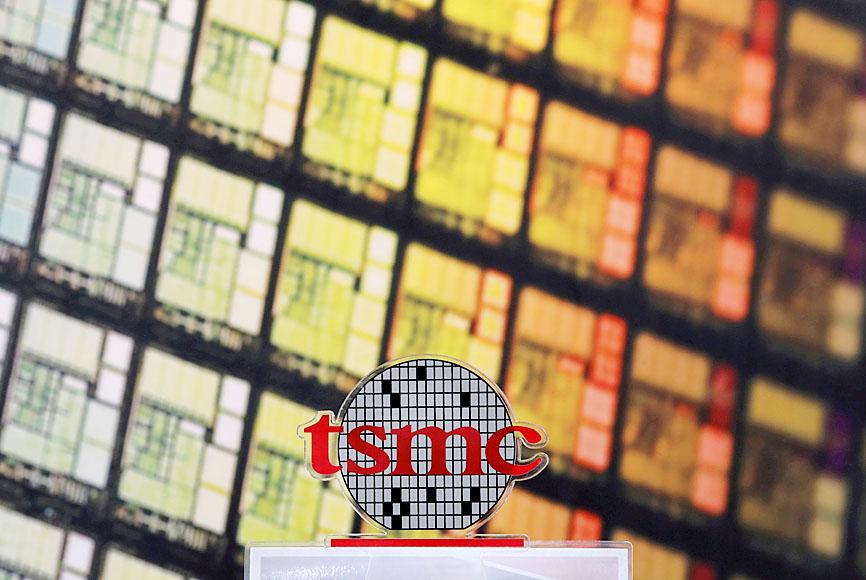The global semiconductor supply chain is to see a transformation, spearheaded by the US government’s move to tackle chip shortages and safeguard its economy, which would benefit semiconductor foundries, including Taiwan Semiconductor Manufacturing Co (TSMC, 台積電), Fitch Ratings said yesterday.
The US Innovation and Competition Act (USICA), endorsed by the White House and passed by the Senate, would allocate large-scale funding for domestic chip production to alleviate supply chain crunches and ensure dependable semiconductor sourcing. The bill is awaiting passage by the US House of Representatives.
Leading chip makers such as TSMC, South Korea’s Samsung Electronics Co and the US’ Intel Corp would be the biggest beneficiaries due to their specialty in producing leading-edge nodes, Fitch said.

Photo: Tyrone Siu, Reuters
The windfall would extend to capital equipment suppliers such as KLA Corp and ASML Holding NV for supplying the tools used in the production of advanced chips, Fitch said.
The bill is intended to boost global competitiveness in industries deemed critical, with US$250 billion of government investment, it said, adding that about US$52 billion is to fund semiconductor research, design and manufacturing initiatives.
The US Department of Commerce expects the policy to unlock private investment, resulting in US$150 billion or more in funding for seven to 10 new US-based factories.
Several firms have announced expansion plans in the US. TSMC has announced a US$12 billion plan to build a 5-nanometer plant in Arizona, with media reports saying it is mulling up to five additional plants. Intel expects to invest US$20 billion in two new manufacturing facilities in the same state and Samsung intends to spend US$17 billion on a new 5-nanometer plant in Austin, Texas.
US policymakers view the semiconductor industry as strategically important because it supplies the fundamental enabling technologies for advanced defense, communications, big data and artificial intelligence among other industries, Fitch said.
The ongoing semiconductor shortage, driven by a confluence of factors, including inadequate capacity and stronger-than-expected demand, has highlighted supply chain vulnerability, it said.
The predicament also underscores the need to secure a dependable source of semiconductor components as the US’ share of semiconductor production has declined to about 12 percent from 37 percent in 1990, it said.
The global chip shortage has enhanced the bargaining position of foundries, Fitch said, adding that TSMC recently announced price increases of up to 20 percent.
Some chip consumers are making upfront payments to secure supply, Fitch said.
Electric vehicle maker Tesla Inc is expected to pay in advance to secure capacity, while Apple Inc has reserved TSMC’s initial capacity of 4-nanometer for its latest generation MacBook, it said.
TSMC supplies 50 to 55 percent of global semiconductor output and is the only foundry capable of turning out 7-nanometer and even more advanced chips, which enable everything from the latest smartphone models to graphics processing units used in data centers and artificial-intelligence applications.
TSMC’s operations are primarily centered in Taiwan, resulting in heightened geographic concentration risks, as earthquakes, droughts and blackouts have challenged manufacturing, Fitch said.
Ongoing droughts have the potential to affect TSMC’s production volume, as it uses 63,000 tonnes of water per day, it said, adding that Taiwan is also dealing with a COVID-19 outbreak.

Sweeping policy changes under US Secretary of Health and Human Services Robert F. Kennedy Jr are having a chilling effect on vaccine makers as anti-vaccine rhetoric has turned into concrete changes in inoculation schedules and recommendations, investors and executives said. The administration of US President Donald Trump has in the past year upended vaccine recommendations, with the country last month ending its longstanding guidance that all children receive inoculations against flu, hepatitis A and other diseases. The unprecedented changes have led to diminished vaccine usage, hurt the investment case for some biotechs, and created a drag that would likely dent revenues and

Macronix International Co (旺宏), the world’s biggest NOR flash memory supplier, yesterday said it would spend NT$22 billion (US$699.1 million) on capacity expansion this year to increase its production of mid-to-low-density memory chips as the world’s major memorychip suppliers are phasing out the market. The company said its planned capital expenditures are about 11 times higher than the NT$1.8 billion it spent on new facilities and equipment last year. A majority of this year’s outlay would be allocated to step up capacity of multi-level cell (MLC) NAND flash memory chips, which are used in embedded multimedia cards (eMMC), a managed

CULPRITS: Factors that affected the slip included falling global crude oil prices, wait-and-see consumer attitudes due to US tariffs and a different Lunar New Year holiday schedule Taiwan’s retail sales ended a nine-year growth streak last year, slipping 0.2 percent from a year earlier as uncertainty over US tariff policies affected demand for durable goods, data released on Friday by the Ministry of Economic Affairs showed. Last year’s retail sales totaled NT$4.84 trillion (US$153.27 billion), down about NT$9.5 billion, or 0.2 percent, from 2024. Despite the decline, the figure was still the second-highest annual sales total on record. Ministry statistics department deputy head Chen Yu-fang (陳玉芳) said sales of cars, motorcycles and related products, which accounted for 17.4 percent of total retail rales last year, fell NT$68.1 billion, or

In the wake of strong global demand for AI applications, Taiwan’s export-oriented economy accelerated with the composite index of economic indicators flashing the first “red” light in December for one year, indicating the economy is in booming mode, the National Development Council (NDC) said yesterday. Moreover, the index of leading indicators, which gauges the potential state of the economy over the next six months, also moved higher in December amid growing optimism over the outlook, the NDC said. In December, the index of economic indicators rose one point from a month earlier to 38, at the lower end of the “red” light.